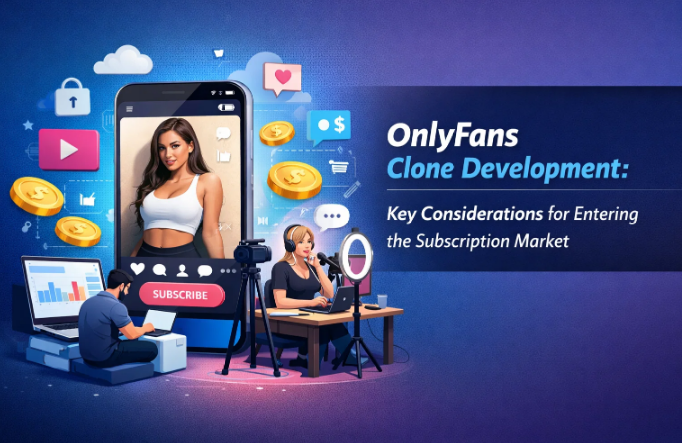In the hyper-connected society we live in today, smartphones have transcended being a simple communication device—they’ve become integral to the way we work, live, and communicate. From buying dinner and settling bills to social networking and trip planning, there’s almost an app for anything. This upheaval has shifted the demand for mobile app development services to historic highs, compelling them to become a primary driver of digital change across industries.
But what is really going behind the success of an app? How are companies—startups to multinational corporations—using mobile apps to connect with customers, simplify their operations, and outrun the competition?
Let’s see how mobile app development is making its mark on our digital landscape and which trends are scripting its destiny.
1. Why Mobile Apps Are a Business Necessity, Not a Luxury
A few years back, an app was something tech giants used as a luxury. Now, it’s a necessity. Smartphone owners spend more than 4 hours a day on the phone, and 90% of that is spent in apps. As a shopping hub, doctor’s office, or school system, mobile apps provide a simple, one-on-one connection to your audience.
This change in behavior is the reason why investing in mobile app development services is no longer a choice. Apps allow businesses to:
Provide frictionless user experiences
Gather real-time data for smart decision-making
Enhance customer retention with engagement
Provide services 24/7 with no human intervention
Companies that do not have a mobile-first approach risk becoming irrelevant and losing revenue.
2. Trends Driving the Evolution of Mobile App Development
To stay competitive, one needs to understand the current trends that drive mobile app development. These trends are not just passing fads—they’re what drive how services are built and used in the present.
A. Integration of AI and Machine Learning
Today’s mobile apps are becoming intelligent. With AI and ML, apps can now support hyper-personalized experiences. Consider Spotify recommending songs based on your mood or health apps monitoring and forecasting your wellness patterns.
Mobile app development services with AI capabilities can revolutionize user experience and engagement by bringing in features like:
Voice commands and chatbots
Predictive analysis
Automating intelligent decision-making
B. 5G Technology
5G is not merely about speed—it’s a mobile app game changer. More speed and less lag enable more creative, real-time experiences like AR/VR features, instant video streaming, and real-time online multi-player games.
Mobile application development firms are already leveraging this, providing experiences that were unthinkable even a few years back.
C. Cross-Platform Development
The time when apps had to be developed separately for Android and iOS is behind us now. With platforms like Flutter and React Native, the app can be developed once and deployed across many platforms. Not only does this accelerate time to market but also lower development expenses—something that is a perfect fit for new businesses and startups.
3. The Role of UX/UI in App Success
Though usability is crucial, UX and UI design are what they return to. A one app that is pretty and has decent usability tends to win over a more functional app but with abysmal navigation.
Contemporary mobile application development services prioritize design thinking, making each tap, swipe, and scroll a component of frictionless experience. They encompass:
Seamless onboarding flows
Intuitive call-to-action buttons
Adaptive layouts for diverse screen sizes
Accessibility features for people with disabilities
User-centered design is no longer a choice—it’s the secret to successful mobile apps.
4. Security: Top Priority for Developers and Users
Cyber attacks and data breaches are increasingly common, so security is now the foundation of mobile app development. Users are growing more conscious—and suspicious—of the use of their data. Developers are therefore creating secure apps from scratch.
Successful mobile app development services now include:
End-to-end encryption
Biometric authentication (e.g., fingerprint, facial recognition)
Secure API interactions
Regular security updates and audit
Security being the top priority by companies not only secures them but also gains the trust of their users.
5. Real-World Use Cases: Mobile Apps Making a Difference
Let’s explore how various industries are leveraging mobile apps to take their businesses in new directions:
Healthcare
Telemedicine apps such as Teladoc and Zocdoc enable users to remotely see doctors, schedule appointments, and view medical records—all from their mobile devices.
Retail
Sephora and Amazon utilize mobile apps to provide personalized shopping experiences, AR product testing, and one-click buying.
Education
Duolingo and Coursera leverage gamification and push notifications to keep learners engaged.
These are a few of the ways that mobile app development services can be customized to achieve certain business objectives and user needs.
6. Getting the Right Development Partner
When you’re thinking of investing in a mobile app, finding the right development partner is important. The best team doesn’t only code—they comprehend your business, your users, and your objectives.
This is what you should look for in a mobile app development agency:
Proven track record and portfolio
Clear communication
Adaptive development process
Assistance and updates after launch
Customization and scalability features
A robust partnership ensures that your app keeps thriving long after launch.
Conclusion: Welcome the Mobile-First Future
The mobile revolution has merely started—it’s just warming up. As new technology takes shape and demands from consumers continue to increase, companies must stay nimble and innovative. From mobile app development services, companies not only get to keep up with the needs of the users but also drive growth and innovation.
Whether you’re launching a new startup or looking to modernize an existing enterprise, mobile apps offer a scalable, user-friendly solution for long-term success. The key lies in staying updated, embracing change, and choosing the right development strategy.
For more interesting blogs click here.
















Leave a Reply